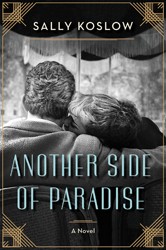The British Lion is the sequel to Tony Schumacher’s first novel, an alternate history in which the Nazis actually win World War II, occupy England, and are supported by the United States government.
John Rossett, hero of The Darkest Hour, returns to help his Nazi boss save his daughter, who has been kidnapped by American spies. He must find Ruth Hartz, a Jewish scientist imprisoned by the Germans and forced to work on developing an atom bomb, so she can be swapped for the daughter. Rossett battles not only the Nazi occupiers, but also the British Resistance from the criminal underworld, as well as some rogue American spies led by Allen Dulles, working covertly to defeat Hitler.
Besides the real-life figure of Dulles, Schumacher also includes Joe Kennedy as ambassador to the United Kingdom and Charles Lindbergh as president of the United States. Both men desire to maintain a good relationship with Hitler as a means of starting an international trade agreement. Where many historical books ignore Kennedy’s and Lindbergh’s anti-Semitism, Schumacher uses it to enhance the plot, exposing the true facts of Lindbergh’s views regarding the Jews — considering them sinister, corrupt, and committed to destroying Christian morality — and Kennedy’s positive perspective on appeasement with Hitler, especially as it related to the economic ties between the two sides.
But the most powerful part of the novel is its theme, what will people morally sacrifice to pay the price for their life? This is brought home by the quote, “We’re part of a machine, John…whatever I think about the machine, how I feel about what it does, it doesn’t matter. If I don’t do what I’m supposed to do…I die.” The author also takes the theme one step further by having readers decide if the person with the clipboard is as responsible or more responsible for the Jewish deaths than the ones who actually did the killings.
Through his brilliant character development, Schumacher garners sympathy not only for Ruth, the Jewish scientist, but for her Nazi-collaborator rescuer, John Rossett. Ruth is the only one in the story with intact moral integrity, willing to kill herself to make sure the Nazis never get the bomb. Rossett comes across as someone wanting to make amends, to become a better person, since his original job was to displace Jews. Although it may be impossible to grant this complex and flawed character a full pardon, readers will find themselves rooting for him as he tries to overcome his sins by fighting subversively against the Nazi regime.
The British Lion reminds readers in many different ways about man’s inhumanity to fellow man. Schumacher has clearly done his historical research about Nazis, their sympathizers, and the Holocaust; he mixes those facts into a riveting story, creating an alternate history that makes his readers tremble with the realistic possibilities.
Related Content:




